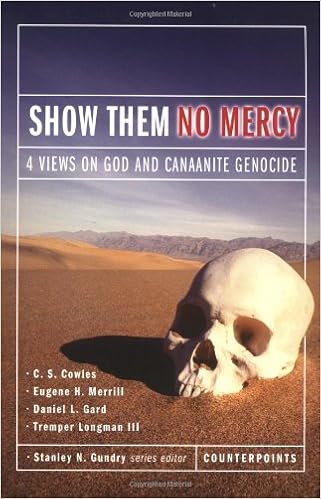A Summary of Show Them No Mercy in 4 Parts:View Number 3 (Eschatological Continuity)
View Number 3: Eschatological Continuity
Daniel L. Gard’s position is that of Eschatological Continuity. To summarize, this view sees ancient Israel as God’s theological, political and chosen people to punish the Canaanites via genocide and occupy a land that God had granted them. God acted through Israel to perform this function. Gard goes further into the Old Testament also to argue that sometimes God acted solely in the destruction of His enemies in a type of herem. He sees that as the only justifiable genocide of history and it will only be repeated by God in the last days when he commits a final herem upon the people of the Earth.
There is a lot to praise in this portion of the book though I don’t favor his view. On page 116, Gard gives a great summary of what herem (or the ban) means and how it was acted out in the biblical accounts versus the Canaanites. Rooted in what I see as his evident Reformed background, Gard is terrific on the attributes of God and thus His character and conduct. However, it is that reformed position that I take issue with but not that alone.
My reformed brethren are very good on many of the doctrines of God. I respect that. However, in their view of Israel I would have to disagree. I believe it is clear that God’s promises are of an everlasting covenant (Genesis 17:7, 13, 19), an everlasting possession of the land (Genesis 17:8: 48:4) and their being His everlasting covenant people (Genesis 17:7). The reformed movement sees the Church as inheriting the promises to Israel and therefore Israel has no right to call itself the people of God today unless they as individuals are incorporated into the Church through salvation in Jesus Christ. While I agree with the Apostle Paul in being burdened for the salvation of the Jews, I believe that God’s Word is quite clear that His covenant with them is irrevocable and while they may be faithless, God remains faithful.
Gard views Israel’s activity as historically accurate. He sees the Scriptures as a reliable historical text. Thus he believes that Israel was divinely sanctioned to commit “genocide” against the Canaanites. As I mentioned with the second view, a view that I favor by the way, I believe that the very meaning of genocide is inherently negative and evil. What God did through Israel as recorded in the Old Testament was not evil so the term genocide, not being a neutral or good term, is inadequate and in fact detrimental in describing what God did and why He did it. While applauding Gard for his high view of Scripture, I disagree on this as I did when Merrill used the term.
No nation of people today, argues Gard, are the people of God on earth today as ancient Israel once was. I have already discussed my disagreement with this assessment. The Church alone is the people of God, he continues. And making the link to eschatology, or the last days, Gard argues that “the Lord of the Church alone,” not the Church, will conduct a “great and final herem.”
He correctly asserts that genocide in our world today is always wrong and never justifiable and that the Church has never been authorized by God in the mass murder of others. While this view adequately separates ancient Israel’s activity versus the Canaanites from what was done in the Crusades, in Rwanda, Bosnia and throughout Europe under the Nazis, etc., I do not believe it bests settles the argument as to why Israel was justifiable in its behavior versus the Canaanites while no one since has been. Also, I would not classify God’s coming wrath in His Second Coming as genocide either.
In conclusion, I would advocate for the second position, The Case for Moderate Discontinuity, but would understand that many of my Reformed brethren would embrace this view instead. To me, it is a close second in best explaining the justification of Israel’s actions regarding the Canaanites and its being unlike what is done in our modern world. Daniel Gard does the Reformed movement a great service despite my disagreement.
View number 1: Radical Discontinuity
View number 2: Moderate Discontinuity
View number 4: Spiritual Continuity



Comments
Post a Comment